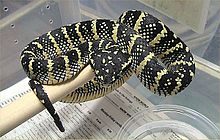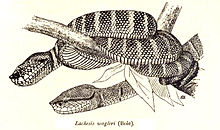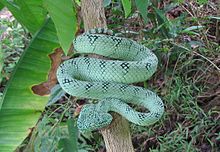- Tropidolaemus wagleri
-
Tropidolaemus wagleri 
Scientific classification Kingdom: Animalia Phylum: Chordata Subphylum: Vertebrata Class: Reptilia Order: Squamata Suborder: Serpentes Family: Viperidae Subfamily: Crotalinae Genus: Tropidolaemus Species: T. wagleri Binomial name Tropidolaemus wagleri
(Boie, 1827)Synonyms - C[ophias]. Wagleri - H. Boie, 1826
- [Cophias] Wagleri - F. Boie, 1827
- Tropidolaemus wagleri - Wagler, 1830
- Trigonoc[ephalus]. wagleri - Schlegel, 1837
- Trimesurus maculatus - Gray, 1842
- Trimesurus Philippensis - Gray, 1842
- Trimesurus subannulatus - Gray, 1842
- Trigonocephalus Wagleri var. Celebensis - Gray, 1849
- Trigonocephalus Wagleri var. Sumatrensis - Gray, 1849
- Tropidolaemus hombronii - Guichenot In Jacquinot & Guichenot, 1853
- Tropidolaemus wagleri - Duméril, Bibron & Duméril, 1854
- Tropidolaemus hombroni - Duméril, Bibron & Duméril, 1854
- Tropidolaemus Schlegelii - Bleeker, 1857
- T[rigonocephalus]. Hombroni - Jan, 1859
- Tropidolaemus Philippensis - Peters, 1861
- Tropidolaemus subannulatus - Peters, 1861
- Trimeresurus wagleri - Günther, 1864
- Tropidolaemus Schlegeli - Theobald, 1868
- Tropidolaemus subannulatus var. celebensis - Peters, 1872
- Tropidolaemus subannulatus var. immaculatus - Peters, 1872
- Bothrops Wagleri - Müller, 1880
- Lachesis wagleri - Boulenger, 1896
- Trimeresurus wagleri alboviridis - Taylor, 1917
- Trimeresurus philippensis - Taylor, 1922
- Trimeresurus wagleri wagleri - Taylor, 1922
- Trimeresurus wagleri philippensis - Taylor, 1922
- Trimeresurus wagleri subannulatus - Taylor, 1922
- [Bothrops] philippensis - Maslin, 1942
- Tropidolaemus wagleri - Hoge & Romano-Hoge, 1981
- Tropidolaemus philippinensis - David & Vogel, 1996
- Trimesurus philippinensis - David & Vogel, 1996
- Trimeresurus philippinensis - David & Vogel, 1996
- Tropidolaemus wagleri - David & Vogel, 1996[1]
Tropidolaemus wagleri is a venomous pitviper species native to southeast Asia. The epithet, wagleri, is in honor of German herpetologist Johann Georg Wagler. No subspecies are currently recognized.[3] It is sometimes referred to as the temple viper because of its abundance around the Temple of the Azure Cloud in Malaysia.
Contents
Description
This species is sexually dimorphic: the females grow to approximately 1 m in length, while males typically do not exceed 75 cm. They have a large triangular shaped head, with a relatively thin body. Almost entirely arboreal, the tail is prehensile to aid in climbing.
They are found in a wide variety of colors and patterns, often referred to as "phases". In the past, some researchers classified the different phases as subspecies. The phases vary greatly from having a black or brown coloration as a base, with orange and yellow banding to others having a light green as the base color, with yellow or orange banding, and many variations therein.
Common names
Wagler's pit viper, temple viper, temple pit viper,[2] bamboo snake, temple snake, speckled pit viper,[4] temple pitviper.[5]
Geographic range
Found in southern Thailand west Malaysia, in Indonesia on Sumatra, the islands of the Riau Archipelago, Bangka, Billiton, Nias, the Mentawai Islands (Siberut), Natuna, Karimata, Borneo (Sabah, Sarawak and Kalimantan), Sulawesi and Buton, and in the Philippines on the islands of Balabac, Basilan, Bohol, Dinagat, Jolo, Leyte, Luzon, Mindanao, Negros, Palawan, Samar and Tumindao. A type locality is not included in the original description, although Schlegel (1837) given "Sumatra".[1]
Behavior
Nocturnal and arboreal, they appear quite sluggish as they remaining motionless for long periods of time waiting for prey to pass by. When prey does pass by, or if disturbed, they can strike quickly.
Feeding
Their primary diet consists of rodents, birds, and lizards. The pits on the sides of the head between the eyes and nostrils are capable of detecting temperature difference of as little as 0.003 degree Celsius.[6]
Venom
Their venom is a strong hemotoxin, and is potentially fatal to humans.
Taxonomy
This species has undergone much taxonomic reclassification over the years and was previously placed in the genus Trimeresurus. However, their distinctly different morphology and venom characteristics set them apart, so that eventually a new genus was erected in which they were placed together with Hutton's viper, Tropidolaemus huttoni.
See also
- List of crotaline species and subspecies
- Crotalinae by common name
- Crotalinae by taxonomic synonyms
- Snakebite
References
- ^ a b McDiarmid RW, Campbell JA, Touré T. 1999. Snake Species of the World: A Taxonomic and Geographic Reference, vol. 1. Herpetologists' League. 511 pp. ISBN 1-893777-00-6 (series). ISBN 1-893777-01-4 (volume).
- ^ a b Mehrtens JM. 1987. Living Snakes of the World in Color. New York: Sterling Publishers. 480 pp. ISBN 0-8069-6460-X.
- ^ "Tropidolaemus wagleri". Integrated Taxonomic Information System. http://www.itis.gov/servlet/SingleRpt/SingleRpt?search_topic=TSN&search_value=634939. Retrieved 25 May 2007.
- ^ U.S. Navy. 1991. Poisonous Snakes of the World. US Govt. New York: Dover Publications Inc. 203 pp. ISBN 0-486-26629-X.
- ^ Gumprecht A, Tillack F, Orlov NL, Captain A, Ryabov S. 2004. Asian Pitvipers. GeitjeBooks Berlin. 1st Edition. 368 pp. ISBN 3-937975-00-4.
- ^ [1]
External links
- Tropidolaemus wagleri at the Reptarium.cz Reptile Database. Accessed 12 December 2007.
- Ecology Asia page on Tropidolaemus wagleri
- Video of several species, including Tropidolaemus wagleri. on YouTube. Accessed 1 March 2007.
Categories:- Crotalinae
- Reptiles of Indonesia
- Reptiles of Brunei
- Reptiles of Thailand
- Reptiles of Malaysia
- Reptiles of the Philippines
- Fauna of Borneo
Wikimedia Foundation. 2010.


